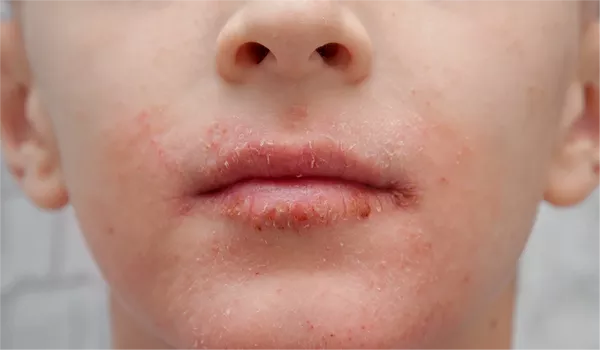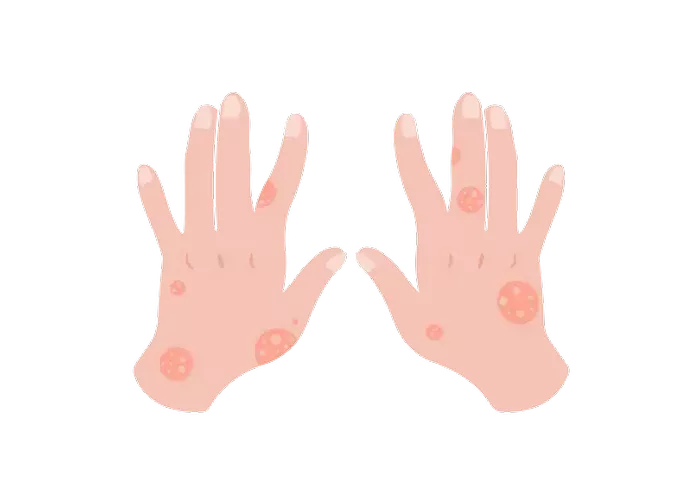Lip licker’s dermatitis, also known as lip licker’s eczema or perioral dermatitis, is a common condition characterized by dryness, redness, and irritation around the lips. This condition is often exacerbated by the habitual licking of lips, leading to a vicious cycle of irritation and discomfort. While lip licker’s dermatitis can affect individuals of all ages, it is particularly prevalent in children and those with sensitive skin. This article will delve into the causes, symptoms, and comprehensive treatment strategies for managing lip licker’s dermatitis effectively.
What is Lip Licker’s Dermatitis?
Lip licker’s dermatitis is a form of irritant contact dermatitis that results from the frequent licking of the lips and the surrounding skin. Saliva contains digestive enzymes, such as amylase and lipase, which can break down the skin’s natural barrier when repeatedly applied. The loss of this protective barrier leads to dryness, inflammation, and the development of a rash around the mouth.
Symptoms and Diagnosis
The primary symptoms of lip licker’s dermatitis include:
- Redness and Inflammation: The skin around the mouth becomes red and inflamed.
- Dryness and Flakiness: The affected area often appears dry and may peel.
- Itching and Burning: Individuals may experience a persistent itch or burning sensation.
- Crusting and Cracking: Severe cases can lead to crusting or cracking of the skin, which may become painful.
Diagnosis is typically made through clinical examination. Dermatologists look for the characteristic rash pattern and consider the patient’s history of lip licking. In some cases, additional tests may be conducted to rule out other conditions, such as allergic contact dermatitis or fungal infections.
Causes and Risk Factors
1. Habitual Lip Licking
The most significant risk factor for lip licker’s dermatitis is the habitual licking of lips. This habit can develop as a response to dry or chapped lips, but it ultimately exacerbates the problem. Each time saliva evaporates, it leaves the lips even drier than before, prompting more licking and further irritation.
2. Environmental Factors
Environmental factors also play a crucial role in the development of lip licker’s dermatitis. Cold, windy, and dry weather conditions can strip moisture from the skin, making the lips more prone to chapping and irritation. Indoor heating during winter months can also reduce humidity levels, contributing to dry skin.
3. Skin Sensitivity and Allergies
Individuals with sensitive skin or pre-existing skin conditions, such as eczema or atopic dermatitis, are more susceptible to developing lip licker’s dermatitis. Additionally, contact with irritants or allergens in lip balms, cosmetics, or foods can trigger or worsen the condition.
Effective Treatment Strategies
Behavioral Interventions
The cornerstone of treating lip licker’s dermatitis is breaking the cycle of habitual lip licking. This requires a combination of behavioral strategies and supportive measures to alleviate symptoms and promote healing.
1. Awareness and Education
Educating patients, particularly children, about the harmful effects of lip licking is essential. Encouraging them to be mindful of the habit and providing positive reinforcement when they avoid licking can be effective. Using visual aids or reminders, such as stickers or notes, can also help reinforce the message.
2. Behavioral Techniques
Behavioral techniques, such as habit reversal therapy, can be beneficial. This involves identifying triggers for lip licking and developing alternative responses. For example, individuals can be encouraged to apply a moisturizer instead of licking their lips when they feel dry or uncomfortable.
Moisturization and Barrier Protection
Keeping the lips and surrounding skin well-moisturized is crucial in treating lip licker’s dermatitis. A variety of emollients and barrier creams can be used to restore the skin’s natural barrier and prevent further irritation.
1. Emollients and Lip Balms
Regular application of emollients, such as petrolatum, lanolin, or glycerin-based products, can help maintain moisture and protect the skin. It is important to choose fragrance-free and hypoallergenic formulations to minimize the risk of irritation. Lip balms containing natural oils, such as coconut oil or shea butter, can also provide soothing relief.
2. Barrier Creams
Barrier creams, such as those containing zinc oxide or dimethicone, can create a protective layer over the skin, shielding it from saliva and environmental irritants. These products are particularly useful for severe cases where the skin is cracked or bleeding.
Topical Medications
In some cases, over-the-counter or prescription medications may be necessary to manage inflammation and promote healing.
1. Corticosteroids
Mild topical corticosteroids, such as hydrocortisone, can be used to reduce inflammation and itching. These should be used sparingly and under the guidance of a healthcare professional, as prolonged use can lead to skin thinning and other side effects.
2. Calcineurin Inhibitors
Topical calcineurin inhibitors, such as tacrolimus or pimecrolimus, are non-steroidal anti-inflammatory medications that can be effective for treating lip licker’s dermatitis. These medications are suitable for long-term use and can be particularly beneficial for individuals with sensitive skin or steroid-induced side effects.
SEE ALSO: How to Treat Nummular Eczema Naturally
Hydration and Nutrition
Proper hydration and nutrition play a vital role in maintaining healthy skin and preventing lip licker’s dermatitis.
1. Hydration
Encouraging adequate water intake can help keep the skin hydrated from within. Drinking water regularly and avoiding excessive consumption of dehydrating beverages, such as caffeinated drinks and alcohol, is essential.
2. Nutrient-Rich Diet
A balanced diet rich in essential nutrients, such as vitamins A, C, and E, zinc, and omega-3 fatty acids, supports skin health. Foods like fruits, vegetables, nuts, seeds, and fatty fish provide these nutrients and promote overall skin resilience.
Avoidance of Irritants
Identifying and avoiding potential irritants and allergens is crucial in preventing and managing lip licker’s dermatitis.
1. Cosmetics and Personal Care Products
Individuals should opt for fragrance-free, hypoallergenic cosmetics and personal care products. Avoiding products with harsh chemicals, alcohol, or artificial fragrances can reduce the risk of irritation.
2. Food Allergens
Some individuals may have food allergies or sensitivities that contribute to lip licker’s dermatitis. Keeping a food diary and noting any correlations between food intake and symptom flare-ups can help identify and eliminate trigger foods.
Environmental Modifications
Making changes to the environment can also help manage lip licker’s dermatitis.
1. Humidifiers
Using humidifiers in the home, especially during winter months, can maintain optimal humidity levels and prevent dry skin. This is particularly beneficial for individuals living in dry or cold climates.
2. Protective Clothing
In cold and windy conditions, wearing protective clothing, such as scarves or face masks, can shield the lips and surrounding skin from harsh weather. This helps to minimize moisture loss and reduce the temptation to lick the lips.
Long-Term Management and Prevention
Consistent Skin Care Routine
Establishing a consistent skin care routine is essential for long-term management and prevention of lip licker’s dermatitis. This includes regular moisturization, gentle cleansing, and protection from environmental factors.
1. Daily Moisturization
Applying a suitable lip balm or emollient several times a day helps maintain hydration and protect the skin. It is important to reapply these products after eating, drinking, or being outdoors.
2. Gentle Cleansing
Using mild, non-irritating cleansers to wash the face and lips can prevent further irritation. Avoiding hot water and harsh scrubbing is also crucial to maintaining the skin’s natural barrier.
Regular Dermatological Consultations
For individuals with persistent or severe lip licker’s dermatitis, regular consultations with a dermatologist can provide valuable guidance and ensure optimal management of the condition. Dermatologists can monitor progress, adjust treatment plans, and recommend advanced therapies if necessary.
Education and Support
Ongoing education and support for individuals and caregivers are essential components of managing lip licker’s dermatitis. Providing information on the condition, treatment options, and self-care strategies can empower patients to take control of their skin health.
Conclusion
Lip licker’s dermatitis, though a common and often frustrating condition, can be effectively managed with a comprehensive approach that addresses both the symptoms and underlying causes. By combining behavioral interventions, proper skin care, avoidance of irritants, and environmental modifications, individuals can break the cycle of lip licking and achieve lasting relief. With consistent care and support, the skin around the lips can heal, restoring comfort and confidence.
Related Topics:























